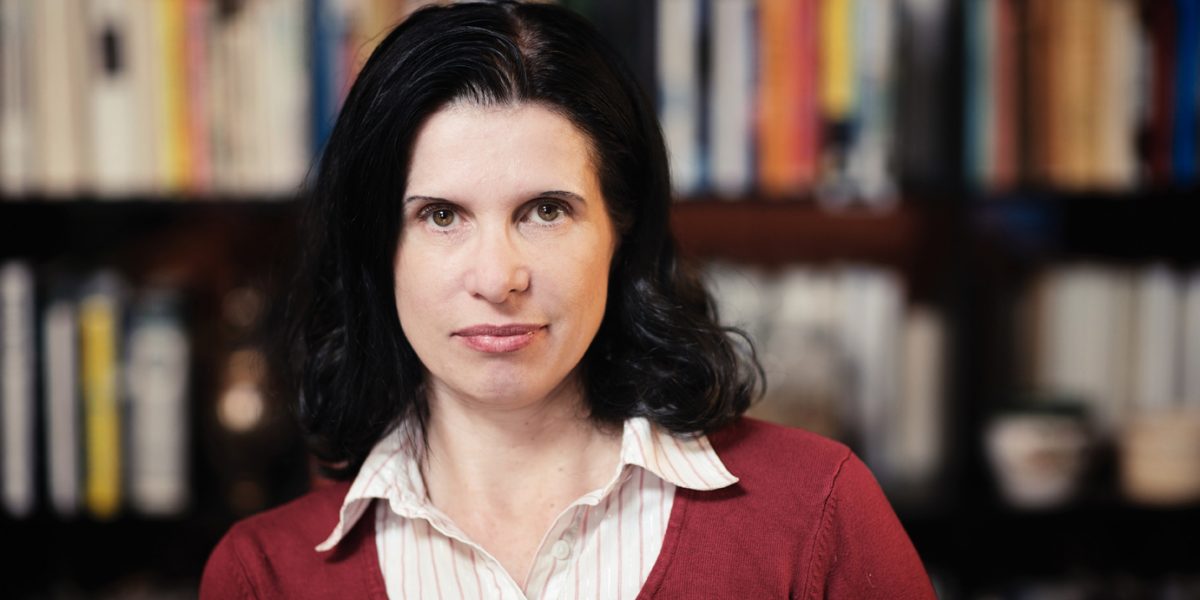Arts & Culture
Superior Beings
We talk to the author of The Great Grisby.
Mikita Brottman, who teaches in MICA’s Humanistic Studies department, loved her dog, Grisby, who passed away just months after she finished the book. The bulldog accompanied her everywhere, from the classroom to the bathtub. If that seems a bit extreme, this spirited book provides context, both historical and personal. Over the course of 26 chapters, Brottman examines the human-canine connection with a historian’s eye for lasting significance and a diarist’s fondness for everyday detail.
Which dog-human relationship in the book most closely mirrors your relationship with Grisby?
Great question! I hadn’t considered it . . . I’d like to say the relationship between Lady Castlereagh, wife of the British foreign secretary from 1812 to 1822, and her controversial female bulldog, Venom. Lady C overfed Venom and adored her, and caused a scandal by letting the dog riding beside her in her carriage. She even took her along to the Congress of Vienna. Like Lady C, I was over-attached to Grisby and would take him everywhere, even when it seemed inappropriate or inconvenient. But most people understood our bond, and came to realize that it was an eccentricity they had to accept. Where I went, Grisby went. That’s just the way it was.
What was Grisby’s favorite place in Baltimore? Why?
Grisby was happy everywhere, even at the vet, but he loved coming with me to Druid Hill Park, where we’d go running and rollerblading together. He always enjoyed meeting other dogs and people, chasing birds and squirrels, and exploring the woods. We’d often run the trails behind the Zoo, and I could tell when Grisby would pick up the scent of an unfamiliar animal. His ears would go up and he’d get very excited.
You write that “Grisby’s not my equal; he’s superior to me in almost every way.” With that in mind, how has dog ownership affected your perception of other people?
I’ve come to pity people who don’t want to be around dogs. Dogs are so truthful and forthright in their emotions, they make humans seem vain and ridiculous in comparison. People who don’t want to be around dogs can’t bear the presence of so much honesty. They’re afraid to face the truth. What’s worse is when they disguise their anxiety in the lie that dogs are a “health risk.” Dog bacteria are specific to dogs. On the other hand, babies—noisier and more irritating than any dog, and genuine sources of transmittable disease—are welcomed everywhere with open arms.
I was hoping Grisby would accompany you to signings/readings, but he passed away soon after you finished the book. Have you gotten another dog? If so, what’s that relationship like?
I have another dog. His name is Oliver. He’s a fawn French bulldog, like Grisby, only about half the size. The love I had for Grisby was transferred to Oliver almost immediately. For the first few days, Oliver felt like a Grisby substitute, but now he’s the Real Thing.
Some of your students seem to appreciate a dog’s presence in the classroom, but others find it annoying. What function did Grisby have at MICA?
Depends who you ask. He was a distraction, mascot, a sidekick, a miracle, scapegoat, an angel, an absurdity, and a threat.
